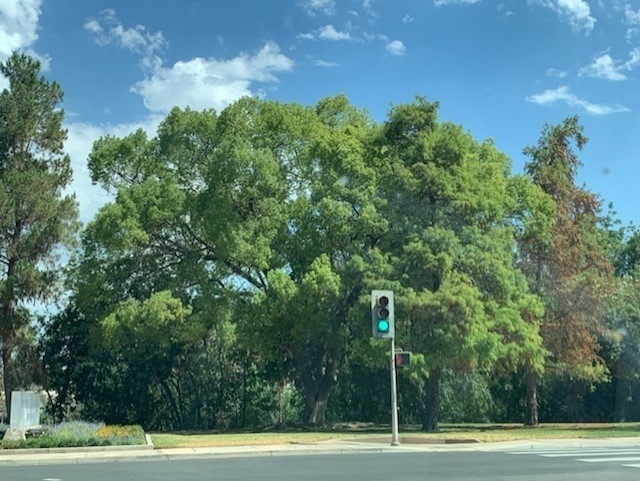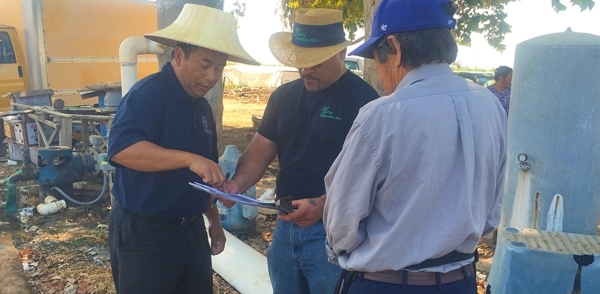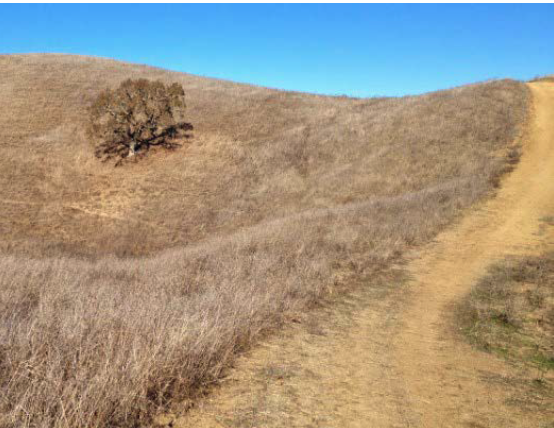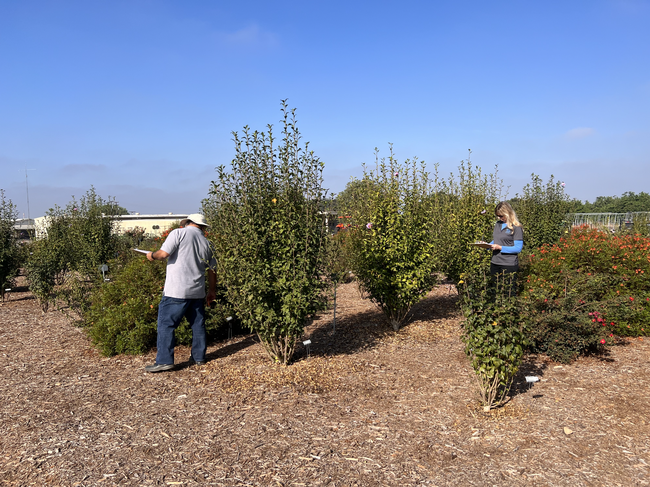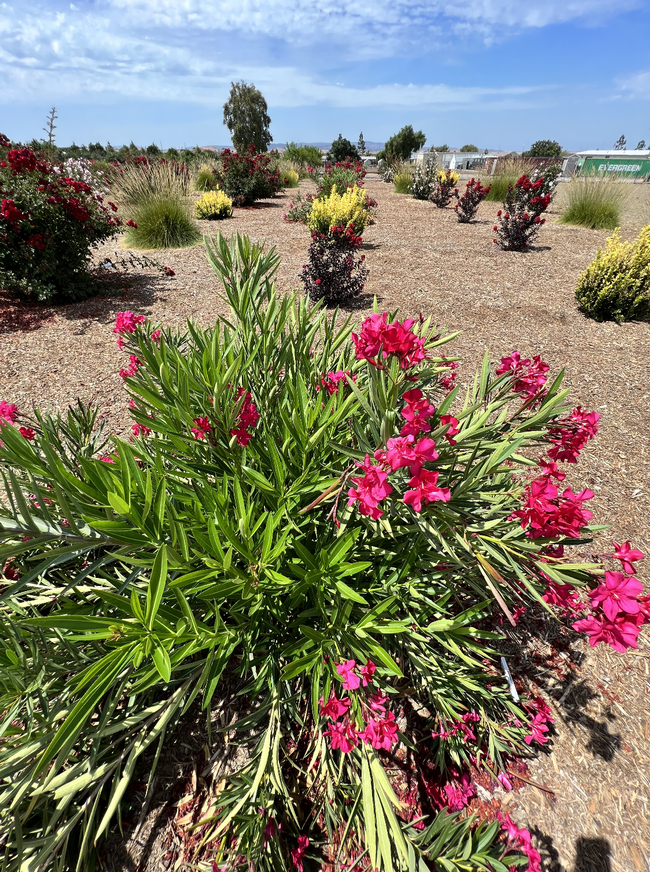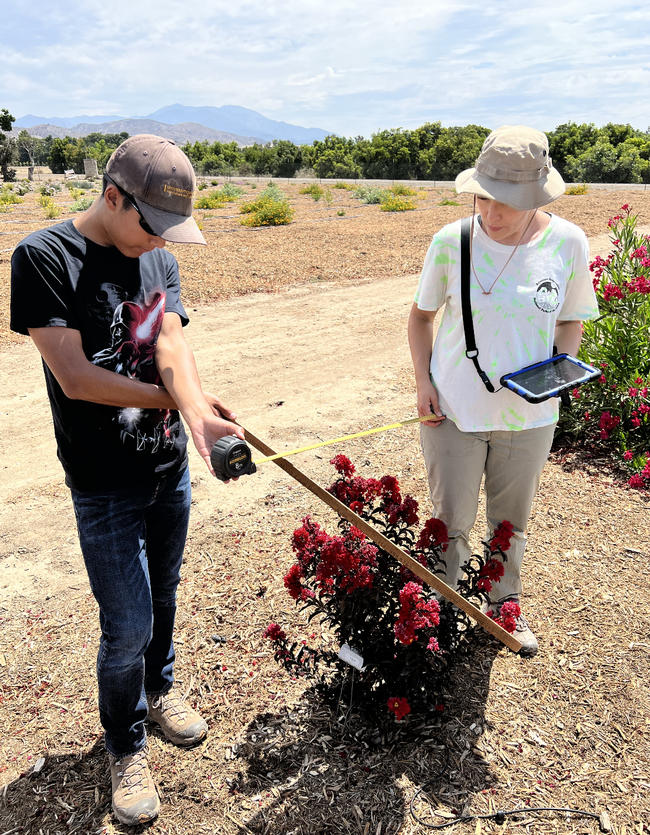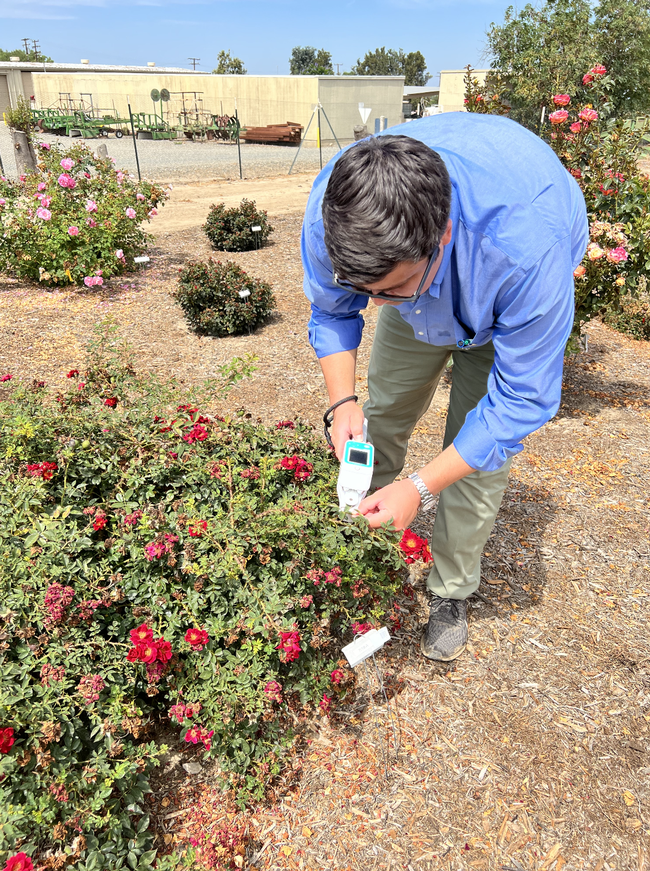Posts Tagged: Prakash Jha
Lawn-pocalypse! Surviving Drought
Ah, summer! The season of sunburns, pool parties, and… lawn droughts. If your once lush, green carpet now looks like a crunchy brown doormat, you're not alone. Let's dive into why your yard is staging a dramatic death scene and what you can do to...

Bermuda grass and weeds overtaking drought stressed turf grass.
Climate-Change Resources
University of California UC ANR Green Blog (Climate Change and Other Topics) https://ucanr.edu/blogs/Green/index.cfm?tagname=climate%20change (full index)
Examples:
- Save Trees First: Tips to Keep Them Alive Under Drought https://ucanr.edu/b/~CdD
- Landscaping with Fire Exposure in Mind: https://ucanr.edu/b/~G4D
- Cities in California Inland Areas Must Make Street Tree Changes to adapt to Future Climate https://ucanr.edu/b/~oF7
Drought, Climate Change and California Water Management Ted Grantham, UC Cooperative Extension specialist (23 minutes) https://youtu.be/dlimj75Wn9Q
Climate Variability and Change: Trends and Impacts on CA Agriculture Tapan Pathak, UC Cooperative Extension specialist (24 minutes) https://youtu.be/bIHI0yqqQJc
California Institute for Water Resources (links to blogs, talks, podcasts, water experts, etc.) https://ciwr.ucanr.edu/California_Drought_Expertise/
UC ANR Wildfire Resources (publications, videos, etc.) https://ucanr.edu/News/For_the_media/Press_kits/Wildfire/ (main website)
-UC ANR Fire Resources and Information https://ucanr.edu/sites/fire/ (main website)
-Preparing Home Landscaping https://ucanr.edu/sites/fire/Prepare/Landscaping/
UC ANR Free Publications https://anrcatalog.ucanr.edu/ (main website)
- Benefits of Plants to Humans and Urban Ecosystems: https://anrcatalog.ucanr.edu/pdf/8726.pdf
-Keeping Plants Alive Under Drought and Water Restrictions (English version) https://anrcatalog.ucanr.edu/pdf/8553.pdf
(Spanish version) https://anrcatalog.ucanr.edu/pdf/8628.pdf
- Use of Graywater in Urban Landscapes https://anrcatalog.ucanr.edu/pdf/8536.pdf
- Sustainable Landscaping in California https://anrcatalog.ucanr.edu/pdf/8504.pdf
Other (Non-UC) Climate Change Resources
Urban Forests and Climate Change. Urban forests play an important role in climate change mitigation and adaptation. Active stewardship of a community's forestry assets can strengthen local resilience to climate change while creating more sustainable and desirable places to live. https://www.fs.usda.gov/ccrc/topics/urban-forests
Examining the Viability of Planting Trees to Mitigate Climate Change (plausible at the forest level) https://climate.nasa.gov/news/2927/examining-the-viability-of-planting-trees-to-help-mitigate-climate-change/
Reports and other information resources coordinated under the auspices of the United Nations and produced through the collaboration of thousands of international scientists to provide a clear and up to date view of the current state of scientific knowledge relevant to climate change. United Nations Climate Action
Scientific reports, programs, action movements and events related to climate change. National Center for Atmospheric Research (National Science Foundation)
Find useful reports, program information and other documents resulting from federally funded research and development into the behavior of the atmosphere and related physical, biological and social systems. Search and find climate data from prehistory through to an hour ago in the world's largest climate data archive. (Formerly the "Climatic Data Center") National Centers for Environmental Information (NOAA)
Think tank providing information, analysis, policy and solution development for addressing climate change and energy issues (formerly known as the: "Pew Center on Global Climate Change"). Center for Climate & Energy Solutions (C2ES)
Mapping Resilience: A Blueprint for Thriving in the Face of Climate Disaster. The Climate Adaptation Knowledge Exchange (CAKE) was launched in July 2010 and is managed by EcoAdapt, a non-profit with a singular mission: to create a robust future in the face of climate change by bringing together diverse players to reshape planning and management in response to rapid climate change. https://www.cakex.org/documents/mapping-resilience-blueprint-thriving-face-climate-disaster
Cal-Adapt provides a way to explore peer-reviewed data that portrays how climate change might affect California at the state and local level. We make this data available through downloads, visualizations, and the Cal-Adapt API for your research, outreach, and adaptation planning needs. Cal-Adapt is a collaboration between state agency funding programs, university and private sector researchers https://cal-adapt.org/
Find reports, maps, data and other resources produced through a confederation of the research arms of 13 Federal departments and agencies that carry out research and develop and maintain capabilities that support the Nation's response to global change. Global Change (U.S. Global Change Research Program)
The Pacific Institute is a global water think tank that combines science-based thought leadership with active outreach to influence local, national, and international efforts to develop sustainable water policies. https://pacinst.org/our-approach/
Making equity real in climate adaptation and community resilience policies and programs: a guidebook. https://greenlining.org/publications/2019/making-equity-real-in-climate-adaption-and-community-resilience-policies-and-programs-a-guidebook/
Quarterly CA Climate Updates and CA Drought Monitor Maps (updated each Thursday) https://www.drought.gov/documents/quarterly-climate-impacts-and-outlook-western-region-june-2022
Drought focus of Water Resources IMPACT magazine special issue
UC ANR experts address emotional toll of drought
Preparing the American West for prolonged drought is the focus of a double issue of Water Resources IMPACT magazine. The California Water Commission staff are guest editors for this special open-access edition of the magazine, which is published by the American Water Resources Association.
Faith Kearns, academic coordinator of University of California Agriculture and Natural Resources' California Institute for Water Resources, is among the authors delving into how drought impacts people and the environment and how we can better prepare for the inevitable.
The first issue, published on Feb. 14, focuses on water scarcity issues confronting California and the ways these issues affect different sectors.
In “Trauma, Care, and Solidarity: Addressing the Emotional Toll of Chronic Drought,” Kearns highlights the effects of drought on mental health. She points to the spike in suicide hotline calls when wells ran dry in Southeast Asian communities in California's Central Valley.
By listening to Southeast Asian farmers, Ruth Dahlquist-Willard and Michael Yang of UC Cooperative Extension were able to “lighten the load” for them by providing pragmatic support, Kearns writes.
“The scale of some of these highly emotional issues – drought, wildfires, climate change – can make them seem incredibly difficult, if not impossible, to deal with,” Kearns said. “At the same time, they are affecting everyone living in the western U.S. on a daily basis. I wanted to highlight and provide models based on work that people – whether they are researchers, clinical psychologists, or Cooperative Extension advisors – are doing right now to ease the way.”
The authors who contributed to the double issue are a diverse array of Tribal experts, academics, nongovernmental organization thought-leaders, water managers and water policy influencers, each of whom brings their own perspective on the topic of drought. Their expertise and perspectives in climate science, water policy and water management will help inform drought-related decision-making and support policies that better prepare the state to thrive during periods of prolonged water scarcity.
In addition to Kearns, the first issue includes articles contributed by:
- Samantha Stevenson, University of California, Santa Barbara
- Jay Lund, University of California, Davis
- Ron Goode, North Fork Mono Tribe
- Andy Fecko, Placer County Water Agency
- Jeff Mount, Public Policy Institute of California, and Ted Grantham, University of California, Berkeley/UC Cooperative Extension
- Nat Seavy and Karyn Stockdale, National Audubon Society
- Kjia Rivers, Community Water Center
- Cannon Michael, Bowles Farming
- Michelle Reimers, Turlock Irrigation District
The January/February edition of Water Resources IMPACT magazine can be accessed, free of charge, on the American Water Resources Association website at https://www.awra.org under “Publications.”
The second issue, to be published in March, will focus on drought response, considering the options for adaptation. This two-part series complements the Commission's work on strategies to protect communities and fish and wildlife in the event of a long-term drought.
UC ANR expands expertise for climate change, economic development with new hires
University of California Agriculture and Natural Resources continued bringing scientists and their practical knowledge to counties across the state throughout the fall and winter. With increased funding from Gov. Gavin Newsom and the state Legislature, UC ANR recently hired UC Cooperative Extension advisors, specialists and academic coordinators who bring expertise in drought, wildfire, food systems, urban and small-scale farms, livestock, 4-H youth development, pest management, wildlife, nutrition and environmental horticulture.
In addition to providing research and extension in traditional subjects, the new hires include scientists who will address water justice policy, climate-smart agriculture, food safety, organic crop production, waste management and economic development for urban and rural communities.
UC Cooperative Extension advisors work directly with community members to apply research-based information to improve the lives and livelihoods of Californians.
To see a list of UC Cooperative Extension advisors who have joined in the past few months, visit https://ucanr.edu/About/DirectorySearch/Recent_Hires. The most recently hired advisors are introduced below.
Audoin joins Central Sierra as UCCE livestock advisor
Flavie Audoin (pronounced Flah-vee Oh-dwan) joined UCCE Central Sierra on Jan. 17 as a livestock and natural resources area advisor serving Calaveras, Amador, El Dorado and Tuolumne counties.
For the last six years, Audoin has been studying the seasonal grazing behavior, diet selection, and meat characteristics of range-fed Raramuri Criollo cattle in southeastern Arizona. Audoin worked directly with Deb and Dennis Moroney, who introduced Criollo cattle in southeastern Arizona about 10 years ago. This experience in the United States provided Audoin with knowledge and skills in rangelands, livestock production (cattle and sheep), direct marketing and science communication. In addition to working on her research, she has also been able to improve her skills as a ranch hand – branding, gathering cattle horseback in rough country, using low-stress livestock handling methods, sheep shearing, fixing fences and water lines, and marketing meat directly to consumers.
Before starting her Ph.D., Audoin was an advisor to beef producers in France and worked for nine years at France's leading brand of packaged meats and meat products while studying.
Born and raised in France, Audoin earned a bachelor's degree in life sciences at Notre Dame de Bonnes Nouvelles, Beaupréau, and technical degree in agronomy with a major in crop and animal production at IUT Angers-Cholet, Angers, then completed an engineering degree in agronomy (equivalent to a masters' degree in the U.S.) with a major in breeding and systems of production at VetAgro Sup, Clermont-Ferrand. She completed a Ph.D. in natural resources from the University of Arizona, where her research focused on ecology, management and restoration of rangelands, with a minor in animal science. She also received a graduate certificate in science communication from the University of Arizona.
Audoin is based in Calaveras and can be reached at faudoin@ucanr.edu and (209) 454-8472.
Ikendi named academic coordinator for climate-smart agriculture
Samuel Ikendi joined UC ANR on Dec. 12 as an academic coordinator for climate-smart agriculture.
As an academic coordinator, Ikendi will work with farmers and ranchers, state and federal agencies, campus-based academics and Cooperative Extension academics across the state to implement climate-smart agriculture education through workshops and training. He will develop outreach materials such as curricula and fact sheets.
Before joining UC ANR, Ikendi worked at Iowa State University as a postdoctoral research associate on a project to establish core concepts to improve graduate plant-breeding education, curriculum development, and monitoring. He also worked for the Center for Sustainable Rural Livelihoods and Iowa State University's Uganda Program in Uganda, where he developed performance tracking indicators, conducted the annual evaluation, and developed privacy data protection documents. As an intern with ISU Extension and Outreach, he assisted the county outreach coordinators with delivering research-based educational programming to promote positive youth development.
Ikendi earned a Ph.D. in agricultural extension education and dual master's degrees in community and regional planning and sustainable agriculture from Iowa State University. He earned a bachelor's degree in agribusiness management from Makerere University, Kampala in Uganda.
Ikendi is based at UC Merced and can be reached at sikendi@ucanr.edu.
Reidy named statewide postfire academic coordinator
Katie Reidy joined UC ANR on Dec. 5 as the statewide postfire academic coordinator. She will be overseeing a postfire forest resilience education program for private forest landowners. Reidy will coordinate weekly educational workshops held on Zoom with lessons catered to specific ecosystems, and collaboration with local agencies to promote post-fire education. The goal is to help fire-affected communities begin the process of reversing the ecological, economic and environmental impacts of fire.
Reidy grew up in Chicago and received an undergraduate degree from University of North Carolina, Asheville. In 2016, she became an environmental educator at Yosemite National Park. In 2020, she moved to Plumas County and worked for the Feather River Resource Conservation District and began to understand the complexities of natural resource management and the implications of fire on the local landscapes. This compelled her to earn a master's degree in environmental studies with a certificate in science communications and environmental education at the University of Idaho.
After personal experience with catastrophic fire, she is eager and ready to connect and assist communities as the postfire academic coordinator, to combine her passion for ecology and forestry management with outreach and education.
Reidy is based at the UCCE Central Sierra office in Placerville and can be reached at kkreidy@ucanr.edu.
Hartmann named UCCE community health and nutrition advisor
Janessa Hartmann joined UC ANR on Nov. 1 as the UCCE community health and nutrition advisor for Shasta, Trinity and Tehama counties to promote education and advance policy, systems and environmental changes that benefit local communities.
Having lived and worked in Shasta County for over a decade, Hartmann is committed to improving the region's health and wellness. She will be developing an integrated and equitable health and nutrition program, applying the latest research and data to address needs identified by the community – especially those of vulnerable populations such as older foster youth.
In addition to focusing on positive youth development, Hartmann also aims to improve food security by expanding access to affordable and healthy food.
“I hope to support community partners in health and nutrition across our region, and amplify existing effective programs,” she said. “I also look forward to working alongside the awesome CalFresh Healthy Living, University of California nutrition education program.”
Although Hartmann began her career in the environmental remediation field, she later worked on food sovereignty and security issues in central Mexico as a Peace Corps volunteer. In 2016, she became the CalFresh Healthy Living, UC program supervisor for Shasta, Trinity and Tehama counties. Subsequently, Hartmann joined Shasta County Public Health, where, during the height of the pandemic, she served as director of the COVID-19 Child Care, School and Higher Education Unit.
Hartmann earned her B.S. in environmental science from Georgia College and State University, an M.S. in environmental science and engineering from Colorado School of Mines and another M.S. in nutritional science from California State University, Chico.
Based at the UCCE Shasta County office in Redding, Hartmann can be reached at jlhartmann@ucanr.edu.
Jha joins UC ANR to address climate adaption
Prakash Kumar Jha joined UC ANR as an assistant project scientist on Nov. 1 and is responsible for developing decision support tools that help growers understand and minimize climate risks, specifically CalAgroClimate.
Prior to coming to California, he worked as a postdoctoral fellow for over five years in Italy, Spain and Colombia. Jha is eager to understand what California's climate will look like in the next five to 10 years. Currently, he is working with climate prediction systems to determine future weather conditions, which growers can use to prepare for situations like low versus high chill hours, shortage of irrigation water and high temperature stress in plants.
Jha recognizes that areas currently used for agriculture might not be suitable for some crops a couple of years from now. For example, Jha is identifying which geographical areas growers should invest in while considering factors such as regulations limiting water use. His work will help growers consider the long-term implications of the decisions they make today.
Before earning a Ph.D. in science management of climate change from the University of Venice Ca' Foscari, Italy, he completed two master's degrees – one in climate change adaptation from the University of the Sunshine Coast, Australia, and another in sociology from Tribhuvan University in Nepal.
Originally from Nepal, Jha is excited about the diversity of crops the California offers. “I'm looking forward to expanding my knowledge, especially in tomatoes, cottons, almonds and pistachios,” he said.
Jha is based at the UC Merced-Sierra Nevada Research Institute and can be reached at prajha@ucanr.edu.
Khodadadi named UCCE plant pathology specialist
Fatemeh Khodadadi joined UC Riverside in October as an assistant professor of extension in the Department of Plant Pathology. She brings expertise in fungal and bacterial diseases of fruit and nut trees and an increasing interest in subtropical plant diseases caused by a variety of plant pathogens.
Khodadadi's research focuses on plant pathogens and disease management strategies for subtropical trees, especially citrus and avocado. She studies identification, characterization and development of molecular methods to detect fungal, bacterial and viral diseases affecting citrus and avocado, including but not limited to avocado branch canker and dieback caused by Botryosphaeria species, phytophthora root rot, sweet orange scab caused by Elsinöe australis, avocado sunblotch viroid and other problematic pathogens on citrus and avocado in California. She also studies the citrus and avocado defense responses to pathogens and the efficacy of fungicides and bactericides.
Before joining UC Cooperative Extension, she held postdoctoral fellowships at Cornell University and Virginia Tech conducting research in bacteriology, mycology, genomics, plant pathology and plant disease management focusing on Colletotrichum species (bitter rot of apple), Erwinia amylovora (fire blight), and Diplocarpon coronaria (apple leaf and fruit blotch).
She identified, described and characterized for the first time a new Colletotrichum species that causes apple bitter rot and belongs to the C. gloeosporioides species complex. Her team named it C. noveboracense.
Khodadadi earned her M.S. and Ph.D. at Shahid Bahonar University of Kerman, Iran. For her M.S., she studied aflatoxin-producing fungi contaminating pistachio. In her Ph.D. research, partly conducted at UC Davis, she studied the interaction between walnut and bacterial blight disease caused by Xanthomonas arboricola pv. juglandis (Xaj).
Khodadadi is based in the UC Riverside Department of Microbiology & Plant Pathology and can be reached at fatemeh.khodadadi@ucr.edu. She will be posting about her research at https://subtropicalplantpathology.com/category/blog-posts/.
Dompka to help spark economy in Del Norte, Humboldt and Trinity counties
Alec Dompka began with UC ANR on Oct. 20 as a rural communities economic development advisor. He will serve as technical support for economic development projects in Del Norte, Humboldt and Trinity counties.
Dompka said he aims to help local communities by working with government entities and private businesses to coordinate and facilitate beneficial projects.
“In this position, I hope to engage with people in the counties to tie them more closely with planning their economic development,” Dompka said. “I hope to show that economic development in rural communities can be locally led and directed, inclusive and effective.”
By applying technical knowledge and science-based expertise to these projects, Dompka said he also hopes to “generate research that pushes forward our understanding of what economic development looks like for rural communities.”
Born and raised in Raleigh, North Carolina, Dompka earned a bachelor's degree from North Carolina State, double-majoring in political science and economics. He also holds an M.A. in agricultural and natural resources economics from NC State.
Dompka is based at the Del Norte County UC Cooperative Extension office in Crescent City and can be reached at (707) 464-4711 or addompka@ucanr.edu. Follow him on Twitter @Alec_rural_dev.
Pearsons named IPM advisor for Monterey County
Kirsten Pearsons began working as a UC Cooperative Extension integrated pest management entomology advisor for Monterey, Santa Cruz and San Benito counties on Nov. 7. This is a new role for Pearsons, who joined UC ANR in March as a small farms advisor in San Luis Obispo County.
Pearsons focuses on insect-related concerns on the Central Coast, such as impatiens necrotic spot virus (INSV), a disease transmitted to lettuce by thrips, and identifying possible solutions. In collaboration with USDA scientists and her UC colleagues, Pearsons is researching the biology and ecology of the thrips populations that vector INSV to identify existing tools and new strategies that can help growers manage thrips and INSV.
Though her research focuses on lettuce and cole crops, Pearsons also supports berry growers and other specialty crop producers in the region with large-scale producers and agricultural pest control advisers as current clients.
Pearsons earned a bachelor's in environmental toxicology from UC Davis and a Ph.D. in entomology from Pennsylvania State University, studying how pest management strategies adopted in field crop systems affect non-target soil invertebrates.
During her undergraduate studies at UC Davis, Pearsons was curious to know what alternatives existed for broad-spectrum pesticides.
“Funny enough, I took my first entomology class just to get a basic idea of insect biology, because a lot of what I was learning in my toxicology courses had to do with insecticides,” she said. “The staff and the other students in the entomology department were so awesome that it didn't take much for me to completely fall for the subject.”
Prior to UC ANR, Pearsons worked for the Rodale Institute, an organic research institute in Pennsylvania.
Pearsons is based out of the UCCE Monterey Bay County office and can be reached at kapearsons@ucanr.edu.
Nguyen named UCCE food safety and organic production advisor
Cuong “Jimmy” Nguyen joined UC Cooperative Extension on Nov. 1 as an assistant food safety and organic production area advisor for Imperial and Riverside counties.
“Organic produce has a shorter shelf life and is more susceptible to outbreaks, recalls and foodborne illness due to the lack of chemical sanitizers and fungicides,” Nguyen said. “Therefore, my future research agenda will continue the focus on improving the quality and safety of organic produce commodities by developing alternatives to chemical fumigations/fungicides, as well as organic pest management without the use of chemical sanitizer or pesticide.”
While earning his Ph.D. in food science at UC Davis, Nguyen developed two novel sanitizing platforms for surface decontamination and liquid systems disinfection. The two systems involve the newly discovered synergistic disinfection effect between natural antimicrobials and UV-A light treatment or ultrasound treatment.
“I am also interested in rapid detection methods using bacteriophage targeting foodborne microbes, and microscopic detection of bacterial microcolonies for early screening and prevention of foodborne outbreaks,” he said.
Nguyen earned a master's degree at Tokyo University of Agriculture in Japan, where he studied sensory and food safety quality of meat, and a bachelor's degree in agriculture at Nong Lam University in Vietnam, where he studied postharvest technologies for food and vegetable commodities. He is fluent in English, Japanese and Vietnamese.
Nguyen is based in Holtville and can be reached at (442) 265-7700 and
cgnguyen@ucanr.edu.
Wang named UCCE plant pathology advisor
Yu-Chen Wang joined UC Cooperative Extension Oct. 3 as a plant pathology advisor for Santa Cruz, Monterey and San Benito counties.
“Vegetable and berry are the major crops I work on currently,” said Wang, who will be working with a wide range of crops and different cropping systems on the Central Coast. “So far, I have been contacted by a wide range of growers – including (those who grow) lettuce, broccoli, pepper, celery, bean, apple, strawberry and blackberry – about their disease problems. I am passionate about providing insight to help the community on their disease problems.”
“The lettuce industry here is suffering from impatiens necrotic spot virus (INSV) vectored by Western flower thrip along with soilborne diseases,” she said. Lettuce growers in the Salinas Valley lost an estimated $50 million to $100 million last year and a lettuce supply shortage occurred. Working alongside fellow advisors, UC specialists and industry partners, Wang will be seeking long-term solutions for the industry.
Prior to becoming a UCCE advisor, Wang worked at AVRDC-World Vegetable Center, for a vegetable seed company, and at UC Kearney Agricultural Research and Extension Center on research and development.
Wang, a native of Taipei, Taiwan, earned her B.S. and M.S. in horticultural and crop science at National Taiwan University. She earned a second M.S. in plant protection from California Polytechnic State University, San Luis Obispo.
“The idea of farmers feeding the world and awareness of crop loss by pests motivated me to pursue a career in agriculture and plant protection,” she said. “During my M.S. at Cal Poly, I worked closely with the California strawberry growers on industry-oriented research. I look forward to extending my study to vegetable and berry crops and serving the farming community.”
Wang is based in Watsonville and can be reached at yckwang@ucanr.edu and (831) 201-9689.
Hooper named UCCE urban community resiliency advisor
Ashley Hooper joined UC ANR on Sept. 1 as the UC Cooperative Extension urban community resiliency advisor in Los Angeles County, a brand-new position. In her role, Hooper is tasked with working with communities who have historically been disadvantaged due to inequitable systems and/or policies.
In collaboration with the community, Hooper will lead efforts focused on building resilience and adaptive capacity. This could look like increasing the community's access to capital, green space, transportation, nutritious food or education.
She already has leveraged data, collected by different organizations, to conduct a content analysis of needs assessments across dimensions of community resilience, such as access to parks and healthcare. Then, as next steps, she will prioritize interviews and field observations.
During her master's program, Hooper worked as a research assistant for the Bureau of Business and Economic Research, where she led interviews with community members facing or trying to counter various inequities like limited access to broadband, housing and health care. For her Ph.D. dissertation, she focused on identifying barriers to and opportunities for resilient food systems in Los Angeles County.
After attending the California Economic Summit in October, Hooper shared her excitement for the prospect of using the arts in building community resilience.
“I went to a creative-economy working group session, and I was reminded of how much the arts and cultural community has to offer in the process of building adaptive capacity in communities,” she said.
Hooper earned a Ph.D. in urban and environmental planning and policy from UC Irvine. She earned a bachelor's degree in psychology and a master's degree in water resources with a concentration in policy and management from the University of New Mexico.
Hooper is based out of the UCCE office in Los Angeles County and can be reached at asmhoope@ucanr.edu.
Solins joins UC ANR as new environmental horticulture advisor
Joanna Solins joined UC ANR on Oct. 3 as a UC Cooperative Extension environmental horticulture advisor for Sacramento, Solano and Yolo counties.
Solins will focus on research and outreach related to urban plants, landscaping and climate change, while building relationships with county and municipal governments, nonprofits, landscape and tree care professionals, nursery growers and utilities, among others. She also will support the UC Master Gardener coordinators in her assigned counties, collaborating to extend knowledge and resources to community members.
“My core goals are to improve the climate suitability and ecological performance of urban landscaping and promote the equitable distribution of benefits from urban plants,” Solins said.
After attaining a bachelor's degree in environmental studies at Vassar College, Solins began her career leading outreach education programs for the New England Aquarium and writing for educational publishers. She also worked in communications at the Coral Reef Alliance in San Francisco before starting graduate school at UC Davis, which culminated in a master's in geography and Ph.D. in ecology.
Solins' research at UC Davis combined field studies and geographic information system analysis to investigate plant communities, tree canopy and soils along urban creeks in the Sacramento area. She also carried out postdoctoral research on green stormwater infrastructure, urban forest composition, and the water demand of urban vegetation across California, and contributed to projects examining residential landscaping and urban heat in Sacramento.
Solins is based in Sacramento and can be reached at jsolins@ucanr.edu or (916) 875-2409.
Mar named UCCE organic materials management advisor
Stephanie Mar joined UC Cooperative Extension on Oct. 3 as the assistant organic materials management advisor serving Los Angeles, Orange and San Diego counties. Mar is responsible for investigating ways to divert organic wastes from landfills to alternative end markets, such as circular food economies, composting and wastewater reclamation.
“To me, waste doesn't have an end life, just a next life,” said Mar. “A lot of people don't know what happens to their waste after the garbage truck comes or they flush a toilet, so a part of my job is to understand what we are wasting and what happens to it.”
Mar attended the University of North Carolina at Chapel Hill where she earned a master's degree in public health focused on environmental science and engineering, and a master's degree in city and regional planning focused on land use and environmental planning. She also has a bachelor's degree in public health from UC Berkeley.
Much of Mar's professional experience, like her time working for the City of Berkeley, is centered on community outreach and policy development, two strengths that she believes will serve her well in this new role.
Previously, Mar worked as a public health analyst for UC San Francisco and as a social research analyst with the North Carolina Department of Health and Human Services too. Both of which strengthened her understanding of policy and program development, implementation, and monitoring and evaluation.
“Research gives us a lot of information, but then there's a need for translation from what we know to what it actually means,” she said. “There are a lot of people doing different things [to manage their waste], so there's a need for coordination and dispersal of information."
Mar's background in policy development is something she'll rely on to operationalize the research being done by herself and her colleagues.
Behavioral change is one of Mar's anticipated challenges in this role. Even if research and policy efforts yield successful results, encouraging the community to adapt can be an uphill battle.
“Sorting trash, for example, is more of a mental burden than a physical one,” she explained. “We know what the research says and what we need to do, it's just about developing the market to make it happen.”
Mar is based out of Irvine at the South Coast Research and Extension Center and can be reached at samar@ucanr.edu.
Dobbin named UCCE water justice policy and planning specialist
Kristin Dobbin has joined UC ANR and the Department of Environmental Science, Policy, and Management at UC Berkeley as a UC Cooperative Extension specialist focused on water justice policy and planning.
Originally from Utah, Dobbin comes to Rausser College from UC Los Angeles' Luskin Center for Innovation, where she was a National Science Foundation postdoctoral fellow. Dobbin pairs her love for rural communities, community natural resource management and environmental justice organizing with a strong belief that research can and should play an important role in advancing policy. She hopes to leverage her new position, the first of its kind for UC, to uplift community water managers and impacted residents as leaders and experts in conversations surrounding water management and access.
“It's a dream and a responsibility to be assuming a role that so perfectly weds research and impact,” Dobbin tweeted about her new UC Cooperative Extension water justice policy and planning specialist role.
Dobbin earned her Ph.D. in ecology with an emphasis in environmental policy and human ecology from UC Davis and B.A. in environmental analysis from Pitzer College in Claremont. Prior to graduate school, she worked for the Community Water Center – a grassroots environmental justice organization that advances community-driven solutions for water justice in the Central Valley.
Dobbin is based at UC Berkeley and can be reached at kbdobbin@berkeley.edu and on Twitter @kbdobbin.
Shive named UCCE forest and fuels management specialist
Kristen Shive has joined UC ANR and the Department of Environmental Science, Policy, and Management at UC Berkeley as a UC Cooperative Extension specialist focused on forest and fuels management.
Bringing more than 20 years of experience in conservation, forest and fire management, and ecology, her work broadly focuses on restoring fire to fire-adapted ecosystems, prioritizing areas for restoration, and understanding shifting fire regimes. Prior to joining UC ANR, Shive led the forest program science team for The Nature Conservancy's California Chapter and was the director of science for Save the Redwoods League. She also has worked for the National Park Service in Alaska, California, and Wyoming, most recently as the fire ecologist for Yosemite National Park.
She earned her master's degree in forestry from Northern Arizona University and a Ph.D. in ecosystem science from UC Berkeley.
Shive is based at UC Berkeley and can be reached at kshive@berkeley.edu and (630) 917-5170 and on Twitter @klshive.
Rodriguez joins 4-H as advisor in Northern California
Matt Rodriguez joined UC Cooperative Extension on Sept. 5 as a 4-H youth development advisor for Nevada, Placer, Sutter and Yuba counties. As a 4-H advisor, Rodriguez implements extension education and applied research programs grounded in positive youth development theory. He also provides expertise to enhance volunteer engagement in 4-H youth development programs.
Rodriguez earned his Ph.D. from the University of Maryland's School of Public Health in the Department of Family Science. His dissertation, “Influence of Latinx Fathers' Behaviors, Cognitions, Affect, and Family Congruence on Youth Energy Balance-Related Health Outcomes,” investigated Latinx father involvement in the context of youth energy balance-related behaviors. During his doctoral training, Rodriguez also supported several USDA-funded research initiatives involving Latinx fathers and youth. His recent publication, "Predictors Associated with Fathers' Successful Completion of the FOCUS Program,” investigated a sample of fathers in Texas who participated in a child welfare parenting intervention.
Rodriguez currently co-chairs the Men in Families focus group at the National Council on Family Relations. He was also recently elected as Section Counselor for the American Public Health Association's Health Informatics Information Technology section.
Prior to his doctoral studies, Rodriguez was a professional web developer for several large nonprofits in the Midwest. Growing up in a multicultural family with ancestry deriving from Puerto Rico, Japan, Nigeria and England, he embraces the importance of cultural diversity and competency in his family science research.
Rodriguez is based in Auburn and can be reached at (530) 889-7391 and mrro@ucanr.edu and on social media @MattR_Rodriguez.
Your water-efficient landscape doesn’t have to be barren
UC climate-ready landscape trials identify low-water yet attractive plants
Good news: roses can be a part of your water-efficient landscape. Lorence Oki, UC Cooperative Extension environmental horticulture specialist in the UC Davis Department of Plant Sciences, identified rose cultivars that remain aesthetically pleasing with little water.
Oki is the principal investigator of the Climate-Ready Landscape Plants project, which may be the largest irrigation trial in the western U.S., and the UC Plant Landscape Irrigation Trials (UCLPIT), the California component of that project. These projects evaluate landscape plants under varying irrigation levels to determine their optimal performance in regions requiring supplemental summer water.
“There are some assumptions that pretty plants use a lot of water, like roses,” Oki said. “Everyone thinks they need a lot of water, but we've found some that don't, and they still look great. A water-efficient landscape doesn't need to look like a Central Valley oak-grassland in the summer. It can look really attractive.”
In 2021, Oki's team at UC Davis identified Lomandra confertifolia ssp. pallida "Pom Pom" Shorty and Rosa "Sprogreatpink" Brick House® Pink as two of the best low-water plants in the trial.
“The useful tip or information that is shared at the end of each trial is the selection and designation of plants as Blue Ribbon winners. These are the plants that looked good with an overall rating of 4 or higher throughout and were on the low (20%) water treatment,” said Natalie Levy, associate specialist for water resources, who manages the project at the UC ANR South Coast Research and Extension Center.
How plants earn a blue ribbon
Each trial year, the selection of new plants is based on research recommendations and donated submissions from the nursery industry. The landscape plants are trialed in full sun or 50% shade cover.
Irrigation treatments are based on the rate of evaporation and plant transpiration (evapotranspiration) measured through a local California Irrigation Management Information System (CIMIS) weather station that provides a reference evapotranspiration (ETo) rate.
Three levels of irrigation are provided to the plants equal to 20%, 50%, and 80% of ETo. The volume of water applied is the same at each irrigation based on soil characteristics, but the interval between applications varies with weather and the treatment. Using this method, irrigations for the 20% treatment are less frequent than the 80% treatment.
“The 20% treatment during the 2022 trial was irrigated an average of once per month while the 80% treatment was irrigated weekly,” explained Levy.
During the deficit irrigation trial, monthly height and width measurements are taken to determine the plant growth index. Monthly qualitative aesthetic ratings on a scale of 1 to 5 are determined for foliage appearance, flowering abundance, pest tolerance, disease resistance, vigor and overall appearance.
A second round of flowering abundance and overall appearance measurements are also taken to capture more of the blooming period. For example, UCLPIT identified in the 2020 trial at South Coast REC that the "Apricot Drift" rose had a mean overall appearance score of 3.5 out of 5, deeming it “acceptable to very nice” and a low water use plant within the Water Use Classification of Landscape Species or WUCOLS guide.
Project expands options for landscape planting
“(WUCOLS) only has 3,500 plants in it. There are guesses that there are close to 10,000 cultivars in urban landscapes in California, if not more,” said Oki. “WUCOLS also didn't have numerical ratings. Instead, you'll see verbal ratings like ‘low water use' or ‘high water use.'”
The UCLPIT project has not only developed numerical recommendations for irrigation, but it has also added new landscape plants that are compliant with California's Model Water Efficient Landscape Ordinance. In fact, UCLPIT's data is one of the few sources that can be used to supplement WUCOLS.
Geographic diversity of trial sites adds to knowledge base
In addition to UC Davis and South Coast REC in Irvine, the trials have expanded beyond California as the Climate-Ready Landscape Plants project and is in progress at Oregon State University, University of Washington, University of Arizona and Utah State University thanks to a USDA/CDFA grant awarded in 2020.
Lloyd Nackley, associate professor of nursery production and greenhouse management at Oregon State University, is the principal investigator of the trial in the Portland metro area, which is entering its third year.
“People know that there are drought tolerant plants, but there are many. We're trying to highlight lesser known or newer varieties. And even though the trial is three years, most gardeners would hope that their garden lasts longer than that,” said Nackley.
One of the observations that Nackley recalls is of the Hibiscus Purple Pillar plant. Unlike the trial at South Coast, the Purple Pillar did not perform well in Oregon in the spring.
“It wasn't until August that we saw the plant bloom and begin to look like what we saw from South Coast in April,” Nackley said.
Ursula Schuch, horticulture professor and principal investigator of the trial taking place at the University of Arizona, was also surprised at the range of performance among different plant types and the effects of irrigation, heat and temperature.
“This research will reassure green industry professionals that they can stretch their water budget to successfully cultivate more plants, watering them according to their needs instead of irrigating every plant according to the highest water-using plants,” said Schuch.
Although research is only conducted in the West, the hope is that there will be trials in other regions of U.S.
Doing so would yield comprehensive information about the plants and their performance in different climates. As extreme weather events persist in the U.S., disease pressure and risks do too. Trials throughout the country would provide location-specific data regarding disease susceptibility.
To learn more about the UCLPIT research project, visit https://ucanr.edu/sites/UCLPIT/

